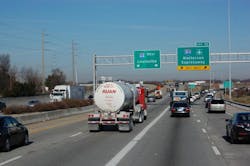I use the world “clash” for good purpose, because Grant Thornton’s quarterly survey – which polls a total of 3,300 business leaders in 45 countries – found that while optimism declined among U.S. business leaders regarding the near-term, their expectations actually increased; especially regarding revenue.
Those divergent findings could hold some importance for fleets for even though business leadership might not be wowed by what they see ahead, they sure expect to make money – and that “making of money” might very well translate into more freight volume.
So let’s take a look at Grant Thornton’s findings.
First, as noted earlier, optimism for the nation’s economic outlook among U.S. business leaders plummeted 16 percentage points in fourth quarter of last year to a net balance of 36%. Hiring expectations in the U.S. declined for the first time in the past year, with a net balance of just 38% of business leaders foreseeing an increase in hiring during the coming year, down from 42% in the third quarter of 2013.
That lack of optimism about the U.S. economy is also consistent with what’s occurring in other markets around the world, Grant Thornton reported, as global business optimism fell to a net balance of 27%, down five percentage points from third quarter 2013.
In particular, optimism among Chinese business leaders declined to a net balance of 22% in the fourth quarter after a 27 percentage-point surge to net 31% in the third quarter of 2013. Elsewhere, Brazil business optimism dropped significantly from a net balance of 31% in the third quarter to 10% in the fourth quarter, a record low for the IBR (Did we need to know that bon mot? Really?), while Russian optimism also declined from a net balance of 19% to just 1% in the fourth quarter last year – the lowest reading reported for that nation since 2011.OK, but now think on this: Grant Thornton also discerned that U.S. business growth expectations actually improved quarter-to-quarter as 2013 came to a close, with a net 65% of businesses expecting to see revenues climb during the next 12 months, up from 50% in third quarter 2013.
On top of that, expectations for profits only dropped slightly, with a net 52% of business leaders in the fourth quarter last year expecting profits to grow over the next 12 months; representing only a slight decline from 54% in the third quarter and a substantial increase from a measly 28% recorded for the fourth quarter of 2012.
All that being said, Grant Thornton found that a net balance of 37% of U.S. businesses leaders in the fourth quarter last year point to “economic uncertainty” as the number one constraint to growing their operations over the next 12 months – a clear sign that few in the business community are viewing the road ahead through rose colored glasses, by any means.
Yet it’s not all doom and gloom out there, by any means, despite the wicked winter weather and uncertainty surrounding just how of Affordable Care Act – more widely known as ObamaCare – will ultimately impact the bottom line of the U.S. business community.
Take the Vistage CEO Confidence Index, for example; a quarterly survey of some 1,578 U.S. CEOS running small- to mid-sized business.
Vistage’s CEO Confidence Index for the fourth quarter last year discerned very optimistic economic expectations – more than any other time in nearly two years – with what the firm dubbed “healthy advances” in revenue and profit expectations.During the first three quarters of 2013, Vistage’s index hardly budged, hovering around 97 or so, the company said. Then in the fourth quarter last year it jumped to 101.5 in, up from 97.8 in the third quarter and well above the 87 recorded in the fourth quarter of 2012 quarter.
“As the pace of economic growth improves in the year ahead, firms will anticipate even greater gains in revenues and profits, leading to more hires and investment spending,” noted Richard Curtin from the University of Michigan in his analysis of Vistage’s fourth quarter index results.
“Naturally, challenges remain on the horizon, including the debt ceiling and implementation of the,” he noted. "In the past several years, each time optimism has improved it has been promptly reversed by economic uncertainty caused by self-inflicted government crises. CEOs learned that the uncertainty caused by the ‘D.C. follies’ could be mitigated by adopting more cautious economic expectations.”
At this moment, however, optimism and expectations seem to be strong in concert with each other, at least according to Vistage’s poll:
- The U.S. Economy Gains Strength: Half of all firms in the fourth quarter 2013 survey reported that the economy had recently improved, and more importantly, more than one-third of all firms anticipated additional gains in the pace of economic growth during 2014. When asked to assess the current state of the economy, 52% reported that the economy had recently improved, up from 46% in the third quarter and just 35% in the fourth quarter of 2012. Just 7% of all firms polled by Vistage reported the economy had recently worsened. Prospects for the economy during 2014 also improved, with 38% of all firms expecting the pace of economic growth to increase, up from 30% in the third quarter of 2013 and 26% in fourth quarter of 2012.
- Higher Sales and Profits: Similar to Grant Thornton’s findings, Vistage discerned that three-fourths of all the CEOs it polled expected revenue gains in 2014, with six in 10 expecting higher profits in the year ahead. These expectations were as favorable as any time during the past six years, Vistage noted, recapturing those same favorable levels for the third time since the Great Recession. Higher sales revenues were anticipated by 76% of all the firms polled, with 60% expecting higher profits, in the fourth quarter of 2013, up from 71% and 545, respectively, in the third quarter and 63% and 49%, respectively, in the fourth quarter of 2012..
- Robust Investment Plans: Planned increases in investments in new plants and equipment were reported by 43% in the fourth quarter of 2013, unchanged from the third quarter but above the 35% reported in the fourth quarter of 2012. Reductions in fixed investments during the year ahead were expected by just 11% in the fourth quarter, down from 20% in the same period back in 2012. Overall, investment plans were at their most favorable level in since the start of 2012.
- Favorable Hiring Plans: Among all firms, 56% in the fourth quarter poll planned on expanding their payrolls during the year ahead, up from 54% in the third quarter and 45% in the fourth quarter of 2012. Hiring plans are now quite favorable; in only one other survey during the past six years were they more favorable.
Again, though, there doesn’t seem to be too much wishful thinking going on here on the part of these CEOS. Indeed, Vistage noted that the bulk of them freely admitted that hiring remains a challenging task as just 11% of firms it polled agreed that finding qualified employees “is an easy task.”
Even if the unemployment rate continues to fall, eight in 10 think it will not get any easier in the future due to the lagging performance of the U.S. education system. More than eight in 10 CEOs also mentioned that their expanded hiring plans were contingent on sales gains, new orders, and an improved economic outlook.
Though fewer than one in 10 of the CEOs in Vistage’s survey cited the influence of taxes or regulations on their decisions, when asked to identify which tax or employer paid benefits were the most important, the overwhelmingly response was “health insurance coverage.”
Things to keep in mind as optimism and expectations should continue to collide in the New Year.



